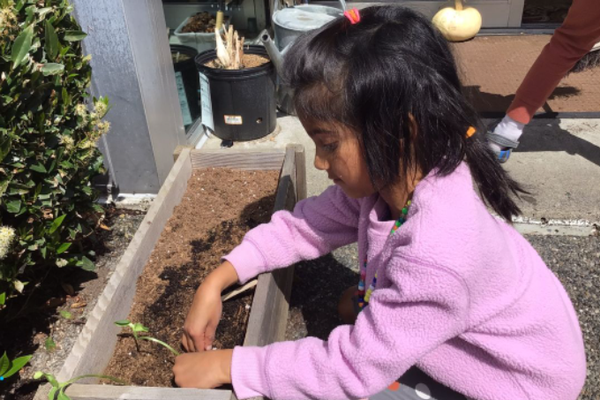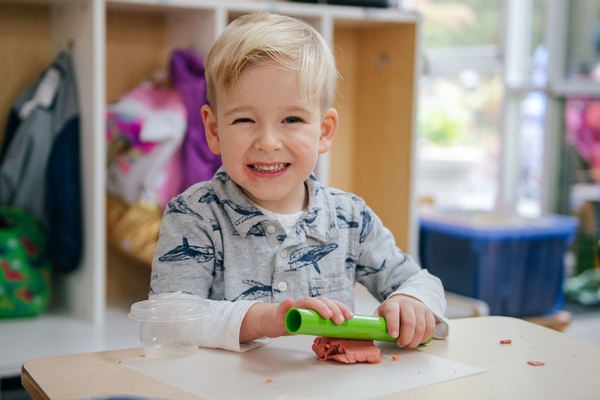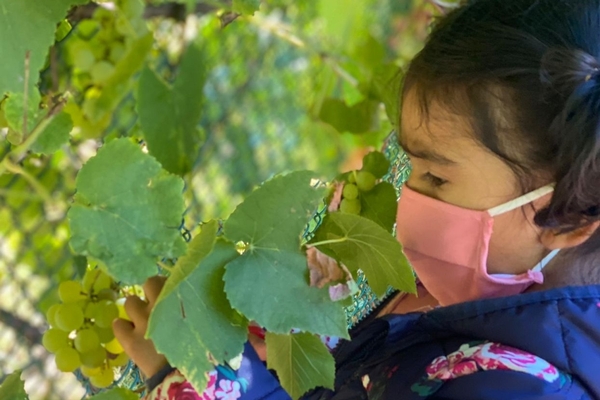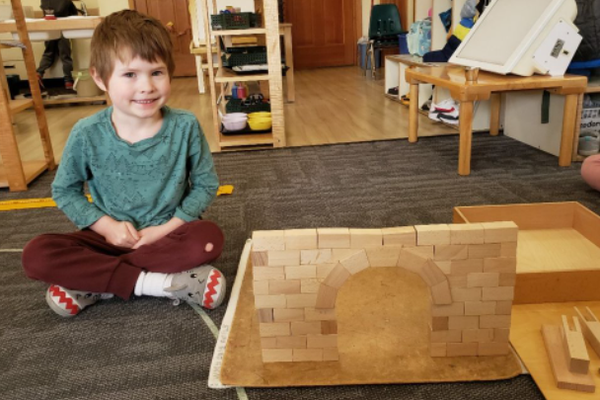 Woodinville Montessori School
Woodinville Montessori School
Early Childhood students are:
- 36 months old by Sept. 1, 2025.
- 5 years of age by Sept. 1, 2025, if entering Kindergarten.
- Toileting independently; no diapers or pull-ups are allowed.
- Able to communicate their needs.
- Able to respond to one-step directions, particularly around safety.
Two campuses offer our Early Childhood program!
Your student will experience the same excellent Preschool/Kindergarten Early Childhood Program whether enrolled at the Bothell Campus or our original Woodinville Campus. Learn more about the campus locations here.
The Age of the Absorbent Mind
Maria Montessori observed that early childhood is a critical time for learning. The 3-6-year-old child goes about effortlessly soaking up information, forming impressions and habits, all of which become the basis for future learning and behavior. Our Early Childhood Program is adapted to the unique and ephemeral learning abilities of the young child. Rich and orderly environments, multi-age classrooms, and freedom to follow one’s interests allow the child to develop fundamental skills that prepare them for life.
The school has been jointly accredited by AMS and NWAIS since spring 2006.
View the Preschool & Kindergarten Sample Weekly Schedule
Kindergarten at WMS
When the Montessori child reaches kindergarten age, they know how to pursue their own learning. Current brain-based research supports the Montessori method of learning through observation, collaboration, and the manipulation of concrete materials, which create and strengthen neural networks. As the child is exposed to concepts in areas of math and language, these networks and purposeful work habits lay a solid foundation for learning on a deeper level. During the kindergarten year, the child begins to apply these critical skills in deeper studies of math, science, language, culture, and the arts; opportunities for this abound in our Montessori environment. It is also a time of leadership and mentoring others.
Importance of environment
Our Early Childhood community includes eight classroom environments, with four classrooms at each campus: Apple Class (Woodinville), Elm Class (Woodinville), Maple Class (Woodinville), Oak Class (Woodinville), Douglas Fir Class (Bothell), Aspen Class (Bothell), Pine Class (Bothell) and Dogwood Class (Bothell). Our Montessori Early Childhood classrooms allow the child to learn in a place of beauty, order and rich opportunity. The emphasis on beauty is out of respect for the child’s developing aesthetic sense. Attention to orderly preparation of the environment minimizes the frustration that occurs when things aren’t ready to use or when an adult needs to help. The attractive selection of activities entices the young child to follow their innate drive to develop physically, emotionally, socially, cognitively, creatively and spiritually.
The adults in the Montessori classroom are highly trained to carefully observe and consistently respect children’s individual needs and interests. Development of independence, concentration, coordination and organizational skills are a direct or indirect aim of many of the class activities.
Children are encouraged to follow their natural desire for repetition and to ask for lessons on new activities as they feel ready. Those who are less assertive about taking on new challenges are invited often to have a new lesson and are supported as their confidence grows.
Daily circle times present opportunities to share verbally; explore literature; experience science and cultural lessons; participate in music, movement and rhythm activities. Outdoor time is another part of each day; children develop important social skills in this atmosphere of unstructured play.
Self-discipline, a natural result
Children are given ample time to work in the learning areas of their choosing, including practical life, art, sensorial, language and reading, math, geography, history, botany, zoology, and physical science. Teachers try to limit disruption of this work time because the chance to focus is so rarely experienced, but so helpful for a young child’s growth. Visitors are often surprised at the calm atmosphere in the classrooms because they are unaccustomed to seeing children so relaxed and absorbed in what they are doing. The emphasis on respect for people and things that permeates all interactions also helps the children to develop self-control and well-rounded social skills.
Learning in the multi-age classroom
Classrooms at Woodinville Montessori School include children in a three-year age span until the Middle and High School levels when groupings range from two to four years. Since classrooms are set up for individualized progress, we are able to take advantage of the inclination of young children to imitate older children.
Older children, in turn, develop higher levels of mastery and confidence as they teach younger children what they know. They experience what it feels like to be a leader, and how to nurture and encourage someone who is less skilled than they have become. At the same time, they continue their own learning as there are no upper limits to the curriculum.
Enrichment & Resources
Resources for Early Childhood families can be found here.
“The foundation of education must be based on the following…: the joy of the child in accomplishing things great for his age; that the real satisfaction of the child is to give maximum effort to the task at hand; that happiness consists of well-directed activity of body and mind in the way of excellence; that strength of body and spirit is acquired by exercise and experience.” —Maria Montessori



